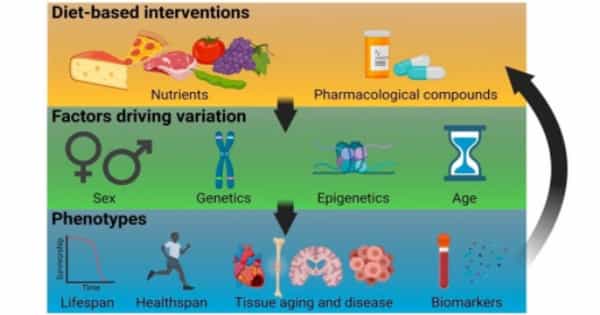There are many different types of dietary restrictions, and their health benefits are not universal. Precision nutrigeroscience, based on biomarkers affected by genetics, gender, tissue, and age, is proposed as a new personalized sub-specialty by researchers.
In many model organisms, including mammals, dietary restriction is arguably the most promising non-genetic method of extending lifespan and health span. While researchers work to develop interventions that mimic the benefits of dietary restrictions in humans (who generally struggle to maintain Spartan diets), research from Buck professor Pankaj Kapahi’s lab suggests that the benefits of dietary restriction often vary between individuals and even between tissues within those individuals. He and his colleagues are pushing the field to reconsider their approach to dietary restriction and to strive for precise, individualized interventions.
In a review published in Cell Metabolism, they provide a framework for a sub-specialty dubbed precision nutrigeroscience, based on biomarkers affected by genetics, gender, tissue, and age.
“Everyone is hoping for a ‘one size fits all’ intervention when it comes to diet, and work in our lab and several others shows that this is simply not going to be the case,” says Kapahi, whose team is working to understand how nutrient signaling and metabolism influence aging and age-related diseases. “I’ve had to change my perspective on aging. Many of us get bogged down in the minutiae of understanding what I call two-dimensional biological pathways, and we forget that these pathways differ in each individual and within tissues in individual bodies. Context matters and we can’t make real progress in this field without including that. We will end up hurting the field because eventually interventions won’t work and then people will get disappointed.”
Researchers provide a framework for a new personalized sub-specialty: precision nutrigeroscience, based on biomarkers affected by genetics, gender, tissue, and age.
Studies in genetically distinct strains of fruit flies showed the need for precision-nutrition
Buck postdoc Kenneth Wilson, Ph.D., the review’s first author, conducted a genome-wide analysis of 160 genetically distinct strains of the fruit fly D. melanogaster that ate the same Spartan diet in 2020. He and his colleagues published their findings in Current Biology, demonstrating that dietary restriction had no effect on lifespan or healthspan. While 97 percent of strains showed some longevity or healthspan extension on the restricted diet, only 50 percent showed a significantly positive response to both. Thirteen percent of the strains were more vigorous, but died sooner as a result of dietary restriction; 5% lived longer but spent more time in poor health. The remaining 32 percent of the strains showed no benefits or detriments to lifespan or healthspan, or negative responses to both.
“I believe it is critical for everyone in the field to understand and appreciate the fact that there are many different ways to look at what intervention may be doing. A response may be observed in one case, but it may not be observed in another strain of the same species “Wilson explains. “On the other hand, if you’re not seeing anything, it doesn’t mean the intervention you’re testing doesn’t work; it just means you’re not using the right model for that intervention,” Wilson emphasizes the importance of researchers being aware of the potential disconnect between extending lifespan and healthspan when it comes to diet. “I think the last thing any of us want to do is give people more years of ill health.”

What the review includes
The review provides a detailed primer on several types of dietary restriction (from caloric restriction to various forms of intermittent fasting, as well as diets that restrict proteins, carbohydrates, specific amino acids, micronutrients, and metabolites) and discusses related effects in yeast, worms, flies, and mice. Nutrient-sensing mechanisms such as IGF-1-like signaling, TOR, and AMPK are explained by researchers. They talk about metabolic reprogramming regulators like sirtuins and NAD, as well as circadian clock regulators. They include fat and lipid metabolism, proteostasis, and autophagy, as well as the reduction of cellular senescence and mitochondrial function.
The authors discuss the complexities of measuring aging in response to dietary restriction, including how lifespan analysis is used to decipher dietary restriction mechanisms, possible gene-specific lifespan responses to dietary interventions, and the role of gender in species with males and females. The authors also discuss the effects and molecular mechanisms of dietary restriction on disease models in both simple animals and mammals, such as diabetes, cardiovascular disease, kidney disease, cancer, and neurodegenerative disease. They also provide an overview of the debate between measuring healthspan and lifespan and summarize molecular biomarkers of aging that have been used in studies of dietary restriction.
For better (and worse) – what we know about humans and dietary restriction
The review also includes information on the effects of dietary restriction in humans. While current research indicates that dietary restriction has a positive effect on neurodegeneration, diabetes, cardiovascular disease, and kidney disease, the authors report that there are indications that restricting what we eat may lower bone mineral density, leading to osteoporosis.
When it comes to normal aging, researchers say that dietary restriction likely has broad benefits across many physiological systems, but data shows that restrictive diets negatively limit wound healing and may impact our ability to recover from fractures. While dietary restriction promotes muscle preservation, data show that it inhibits muscle growth. According to the authors, exercise could help to compensate for those deficits, which adds another factor to consider when researching the effects of dietary restriction. And, while data shows that dietary restriction improves respiratory function, it also shows that exercise capacity may decrease.
What about gender?
Gender, according to Kapahi, is one of the main factors driving variable responses to dietary restriction, repeating a little-known but apt adage: “When it comes to DNA, human males have more in common with male chimps than human females.” He goes on to say that in flies and mice, females are much more sensitive to dietary changes than males, which is likely due to the physiological effects on the female reproductive system and its interactions with other systems. He also points out that, until recently, the majority of studies in mice and humans were conducted with a disproportionate number of males.
Women are more likely than men to develop Alzheimer’s disease. Experts say that two-thirds of Americans suffering from memory-robbing condition are female, and that figure cannot be explained by the fact that women live longer lives than men. Wilson, who now studies neurodegeneration in flies, mice, and human cell cultures, believes diet may one day play a role. “Diet has been shown to improve neuronal function,” he says. “We don’t know all of the mechanisms involved, but figuring out the link between gender and dietary restriction will be part of the plan.”
Implications for clinical trials and potential interventions
According to Kapahi, taking an individualized approach to dietary restriction may result in more targeted and informative clinical trials because researchers will be able to identify and recruit subsets of people who are more likely to respond to a specific intervention. “There’s a good chance we could also increase the number of potential interventions,” he says. “There are likely effective therapeutics that have been overlooked because they did not perform well in a specific strain or species of a model organism. There is a real benefit to abandoning the search for a ‘one-size-fits-all’/’magic pill’ solution to aging’s physical problems.”
















